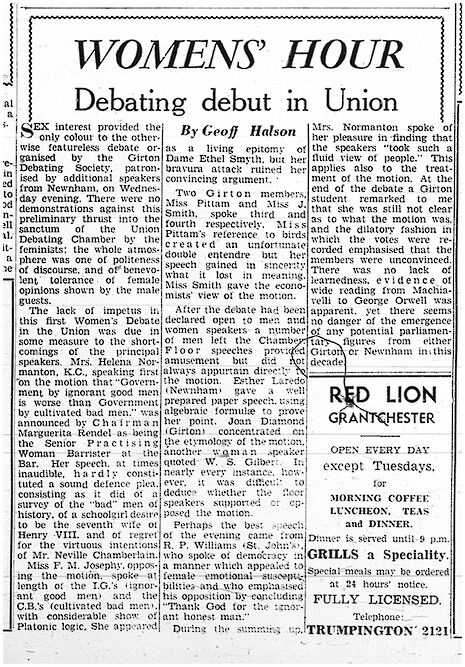Echoes from the past that are all too present
Looking at a copy of Varsity from 65 years ago, the striking thing is what hasn’t changed

“Sex interest provided the only colour to the otherwise featureless debate organised by the Girton Debating Society, patronised by additional speakers from Newnham, on Wednesday evening. There were no demonstrations against this preliminary thrust into the sanctum of the Union Debating Chamber by the feminists; the whole atmosphere was one of politeness of discourse and of benevolent tolerance of female opinions shown by the male guests.”
So ran the opening paragraph of a news article entitled “WOMEN’S HOUR – Debating debut in Union” in an edition of Varsity dated 4th November 1950. I confess that when I went through the archives this week in preparation for the 800th issue, I was looking for something like this. Not specifically the first article covering the opening of Union debates to female students, but some un-self-conscious, wave-of-the-hand, 1950s sexism. The quoted piece was ideal.
“Sex interest”, “the benevolent tolerance of female opinions”, the very fact that a lack of public demonstration against female participation was deemed worthy of comment; there was so much there in the first paragraph alone.
It would have made for a great Facebook status, which was my initial intention. A close-up picture of the article accompanied by sarcastic caption like: “So pleased that nowadays my opinions are benevolently tolerated by men all the time lol.”
But as I read on, I changed my mind. Apart from the obviously dated opening gambit, I was struck by how much else in the article you could almost believe was published yesterday, were it not for the yellowed paper and the date in the top right corner of the page.
After the initial claim that no one demonstrated against the debaters from Girton and Newnham, squirrelled away in the middle of the second column is the admission that after the debate had been declared open to women speakers, “a number of men left the Chamber.” I cast my mind back to our last print edition, specifically a piece entitled: “One breakfast: the real matriarchal conspiracy”. The author, Emily Bailey-Page, highlighted the disproportionate backlash to a proposed breakfast event at Trinity, believed to be reserved exclusively for women and non-binary students. The event did not go ahead in this format, yet the Trinity JCR Women’s Officer still didn’t escape comparisons with members of ISIS from one particularly expressive internet commentator. It seems as though Cambridge has got over sharing spaces, but we haven’t quite learned to let those who historically had to fight their way into the room have a minute to stand in it by themselves and reflect.
Back in 1950, the author candidly tells us: “Floor speeches provided amusement but did not always appurtain [sic] directly to the motion.” I bet they didn’t. How many times have you seen the same thing happen to female politicians, or actors, today? Or, perhaps a better question, when have you ever heard the US Secretary of State being asked about their hairstyle at a press conference? (Hint: when her name was Hilary Clinton.)
The author also gave his opinion on the standard of debate. He deemed some of the speakers’ voices too quiet, mousy and inaudible. Others were too bold, their speeches apparently a “bravura attack” which ruined their convincing argument. The women were apparently too quiet, or too loud, and not one of them got it just right. I’m involved with societies that organise student political debates. It is so incredibly hard to arrange mixed panel events that aren’t 100 per cent male. Or even 75 per cent male.
Some of the major reasons for this are potential speakers’ concerns about being shouted-over, or anxiety about standing there in front of a crowd and suddenly feeling they have nothing important to say. When we do successfully manage to arrange a gender-balanced debate, it’s never the men who come up to me afterwards and ask whether they were too aggressive or “shouty”. It seems we’re still being told that whatever we say, we can’t quite get it just right.
It seems as though I’m stating the obvious, but it’s important to add that of course we do not attend the same institution as the Cambridge students of 1950. In the same Union Debating Chamber the feminists “thrust” themselves into 65 years ago this month, neither of the current presidential candidates is a white man.
This isn’t meant to serve as a tokenistic “Oh look, Cambridge is now all better”. If I needed another case in point, clearly there are still enough people here who thought a university promotional video fronted by a man who’s expressed views like David Starkey’s would be a really good idea. At the same time, I’m not exemplifying a totally isolated exception to a rule. But it’s funny, that in a time and place where we can see a lot has changed, the echoes and overtones of the past are still so distinctly recognisable.
 Features / How sweet is the en-suite deal?13 January 2026
Features / How sweet is the en-suite deal?13 January 2026 Arts / Fact-checking R.F. Kuang’s Katabasis13 January 2026
Arts / Fact-checking R.F. Kuang’s Katabasis13 January 2026 News / SU sabbs join calls condemning Israeli attack on West Bank university13 January 2026
News / SU sabbs join calls condemning Israeli attack on West Bank university13 January 2026 Comment / Will the town and gown divide ever truly be resolved?12 January 2026
Comment / Will the town and gown divide ever truly be resolved?12 January 2026 News / 20 vet organisations sign letter backing Cam vet course13 January 2026
News / 20 vet organisations sign letter backing Cam vet course13 January 2026









